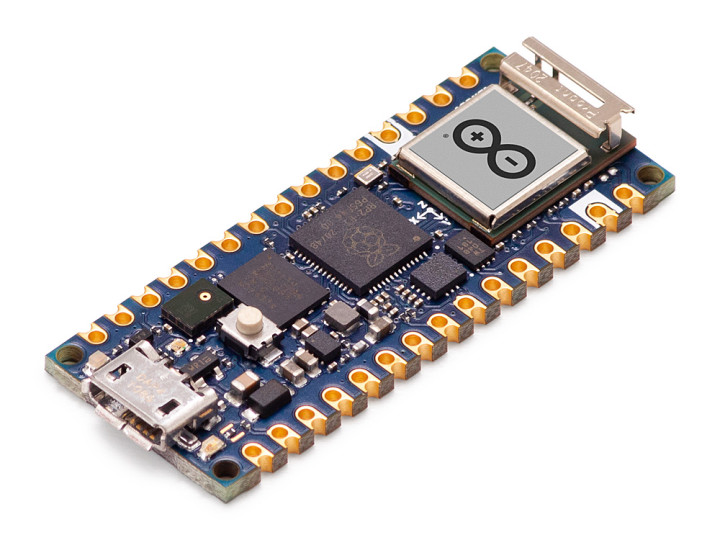The Arduino Nano RP2040 Connect Has Wi-Fi and Bluetooth
May 17, 2021
on
on
Last January the maker scene was taken by surprise when Raspberry Pi launched their Pico Board and their brand-new RP2040 microcontroller – a dual-core ARM Cortex-M0+ running at 133 MHz – as brains. At the same time Arduino too announced an RP2040-based board, but they did not follow up. Today, some four months later, Arduino finally fulfilled their promise with the introduction of the Arduino Nano RP2040 Connect.

The Nano RP2040 Connect comes equipped with a u-blox NINA-W102 Wi-Fi (802.11b/g/n) and Bluetooth v4.2 radio module. This is a module from the same manufacturer as found on the Arduino Nano BLE 33. It is similar to this board in more ways than its name and form factor.
Besides wireless connectivity the board comes with a microphone for sound and voice activation and a six-axis smart motion sensor with AI capabilities. An RGB LED is available too. 22 GPIO ports (20 with PWM support and eight analogue inputs) let the user control e.g. relays, motors and LEDs and read switches and other sensors.
Program memory is plentiful with 16 MB of flash memory, more than enough room for storing many webpages or other data.
The Arduino Nano RP2040 Connect is “Raspberry Pi Compatible”, meaning that it has not only support for the entire RP2040 software ecosystem but also full support for MicroPython. At the same time, the board supports the Arduino programming language, the IDE 2.0 and all the libraries that come with that. Finally, it can be programmed and operated directly from a browser and it is fully compatible with Arduino Cloud and the Arduino IoT Remote smartphone app.

Nano RP2040 Connect Features
The Arduino Nano RP2040 Connect continues where Raspberry Pi left off when they decided not to put wireless connectivity on the Pico Board. Understandable, as it would have bumped the price up, but felt as a missed opportunity by many. (Also, the people at Raspberry Pi surely knew about Arduino’s plans.)The Nano RP2040 Connect comes equipped with a u-blox NINA-W102 Wi-Fi (802.11b/g/n) and Bluetooth v4.2 radio module. This is a module from the same manufacturer as found on the Arduino Nano BLE 33. It is similar to this board in more ways than its name and form factor.
Besides wireless connectivity the board comes with a microphone for sound and voice activation and a six-axis smart motion sensor with AI capabilities. An RGB LED is available too. 22 GPIO ports (20 with PWM support and eight analogue inputs) let the user control e.g. relays, motors and LEDs and read switches and other sensors.
Program memory is plentiful with 16 MB of flash memory, more than enough room for storing many webpages or other data.
The Arduino Nano RP2040 Connect is “Raspberry Pi Compatible”, meaning that it has not only support for the entire RP2040 software ecosystem but also full support for MicroPython. At the same time, the board supports the Arduino programming language, the IDE 2.0 and all the libraries that come with that. Finally, it can be programmed and operated directly from a browser and it is fully compatible with Arduino Cloud and the Arduino IoT Remote smartphone app.
More to Come
In the coming days, I'll take a closer look at the Arduino Nano RP2040 Connect. Stay tuned for an article, video, or both.Read full article
Hide full article


Discussion (0 comments)